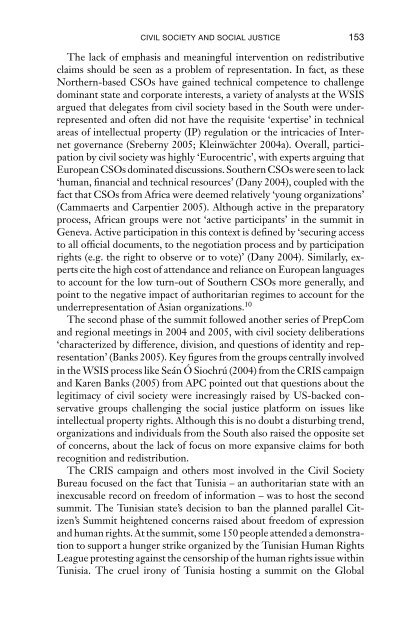Media Policy and Globalization - Blogs Unpad
Media Policy and Globalization - Blogs Unpad
Media Policy and Globalization - Blogs Unpad
You also want an ePaper? Increase the reach of your titles
YUMPU automatically turns print PDFs into web optimized ePapers that Google loves.
CIVIL SOCIETY AND SOCIAL JUSTICE 153<br />
The lack of emphasis <strong>and</strong> meaningful intervention on redistributive<br />
claims should be seen as a problem of representation. In fact, as these<br />
Northern-based CSOs have gained technical competence to challenge<br />
dominant state <strong>and</strong> corporate interests, a variety of analysts at the WSIS<br />
argued that delegates from civil society based in the South were underrepresented<br />
<strong>and</strong> often did not have the requisite ‘expertise’ in technical<br />
areas of intellectual property (IP) regulation or the intricacies of Internet<br />
governance (Sreberny 2005; Kleinwächter 2004a). Overall, participation<br />
by civil society was highly ‘Eurocentric’, with experts arguing that<br />
European CSOs dominated discussions. Southern CSOs were seen to lack<br />
‘human, financial <strong>and</strong> technical resources’ (Dany 2004), coupled with the<br />
fact that CSOs from Africa were deemed relatively ‘young organizations’<br />
(Cammaerts <strong>and</strong> Carpentier 2005). Although active in the preparatory<br />
process, African groups were not ‘active participants’ in the summit in<br />
Geneva. Active participation in this context is defined by ‘securing access<br />
to all official documents, to the negotiation process <strong>and</strong> by participation<br />
rights (e.g. the right to observe or to vote)’ (Dany 2004). Similarly, experts<br />
cite the high cost of attendance <strong>and</strong> reliance on European languages<br />
to account for the low turn-out of Southern CSOs more generally, <strong>and</strong><br />
point to the negative impact of authoritarian regimes to account for the<br />
underrepresentation of Asian organizations. 10<br />
The second phase of the summit followed another series of PrepCom<br />
<strong>and</strong> regional meetings in 2004 <strong>and</strong> 2005, with civil society deliberations<br />
‘characterized by difference, division, <strong>and</strong> questions of identity <strong>and</strong> representation’<br />
(Banks 2005). Key figures from the groups centrally involved<br />
in the WSIS process like Seán Ó Siochrú (2004) from the CRIS campaign<br />
<strong>and</strong> Karen Banks (2005) from APC pointed out that questions about the<br />
legitimacy of civil society were increasingly raised by US-backed conservative<br />
groups challenging the social justice platform on issues like<br />
intellectual property rights. Although this is no doubt a disturbing trend,<br />
organizations <strong>and</strong> individuals from the South also raised the opposite set<br />
of concerns, about the lack of focus on more expansive claims for both<br />
recognition <strong>and</strong> redistribution.<br />
The CRIS campaign <strong>and</strong> others most involved in the Civil Society<br />
Bureau focused on the fact that Tunisia – an authoritarian state with an<br />
inexcusable record on freedom of information – was to host the second<br />
summit. The Tunisian state’s decision to ban the planned parallel Citizen’s<br />
Summit heightened concerns raised about freedom of expression<br />
<strong>and</strong> human rights. At the summit, some 150 people attended a demonstration<br />
to support a hunger strike organized by the Tunisian Human Rights<br />
League protesting against the censorship of the human rights issue within<br />
Tunisia. The cruel irony of Tunisia hosting a summit on the Global

















